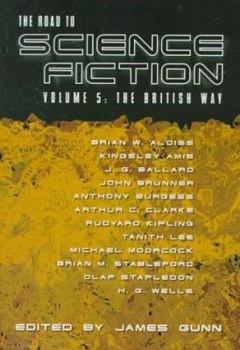The British Way
(Book #5 in the The Road to Science Fiction Series)
The Road to Science Fiction, Vol. 5: The British Way, a new, never-before-published volume, completes the portrait of science fiction in the English language by introducing British SF, which has a... This description may be from another edition of this product.
Format:Paperback
Language:English
ISBN:1565041577
ISBN13:9781565041578
Release Date:March 1998
Publisher:White Wolf Games Studio
Length:600 Pages
Weight:2.05 lbs.
Dimensions:1.8" x 6.0" x 9.0"
Customer Reviews
2 ratings
The Classic Series Continues
Published by Thriftbooks.com User , 21 years ago
Several novels are excerpted here. And one prominent one isn't: Mary Shelley's _Frankenstein_ which Gunn argues is a transition from the gothic but not yet fully in the camp of self-aware science fiction. Lt. Col. Sir George Tomkyns Chesney's _The Battle of Dorking_ is the first of those future war novels written by politicians and military men determined to influence public policy. Edwin A. Abbott's _Flatland_, still in print, is a charming tale of life and culture in a two-dimensional world. That incomparable giant of science fiction, Olaf Stapledon, is represented by a selection from _Star Maker_, narrated by a "cosmical mind" who views the life of the universe. (Though oddly, in this volume, Gunn barely mentions his importance to the genre. For that, you must consult volume two.) The title for the section on Richard Jeffries _After London; Or, Wild England_ is "The Craving for Catastrophe". It is a pastoral tale of a simpler life after an unexplained disaster has befallen the country. That craving shows up in several more tales. Killer smog hits the city in Robert Barr's 1892 story "The Doom of London." "The Great Fog" of H. F. Heard wipes out worldwide civilization. Life gets extinguished on an alien planet in Arthur C. Clarke's much anthologized "The Star." "The Nature of the Catastrophe" in Michael Moorcock's story of that name is never really explained. An amalgam of newspaper excerpts and fiction, this story unfortunately shares the oblique prose and loose setting of his Jerry Cornelius novels. Not readable in its own right, it still gives you some idea of Moorcock's influence on the New Wave. Tanith Lee's "Written in Water" is a last woman on Earth tale. The world that may be destroyed by an artist in J. D. Beresford "A Negligible Experiment" is our own. The disaster of John Wyndham's "The Emptiness of Space" is a personal one. Its hero has survived a spell in cryonic suspension and fears his soul has left his body. As you would expect, the anthology is full of several famous names. Not only are J. G. Ballard and Brian W. Aldiss present in earlier installments of this series, but they also are the only authors to get two stories in this volume. Ballard is represented by "The Voices of Time" (more disaster) and "The Drowned Giant". They serve as a good introduction to his passive protagonists and landscape motifs. If you don't like Ballard, these will do nothing to sway your opinion. The more versatile Aldiss has the witty "Working in the Spaceship Yards" and the decidedly downbeat "Appearance of Life" -- both in their own way dealing with problems of communication in the human species. Genre critic and defender Kingsley Amis shows up with the rather trite, but stylish, "Mason's Life", a short short story about the reality of some's dreams. Anthony Burgess works a new twist on the old cliche of a hack writer ripping off a famous writer via a time machine in "The Muse." An interesting famous name is Rudyard
The Best of British Sci-fi
Published by Thriftbooks.com User , 24 years ago
The Road to Science Fiction: Vol. 5 is an incredible collection of some of the best works of British Authors in Science Fiction. Included are works by Clarke, but also by 30(or so) other authors. It was interesting to me that the collection was 30 stories, yet I had only read one of them. The highlight of this book for me is the short story, "The Hobbyist". It was a very exciting and chilling tale that leads you through many "clues" before you get to see the big picture. There are tales from the late 1800's all the way up to the publish date of the book. It does a good job of showing how British authors have progressed in a much more limited market than we have had in the US. I recommend this book highly to any sci-fi fan.





